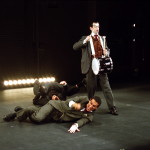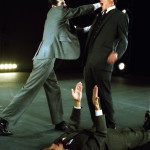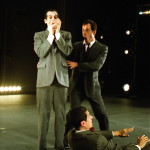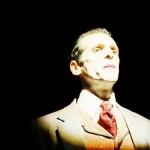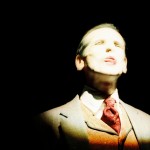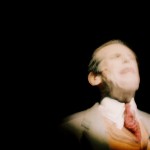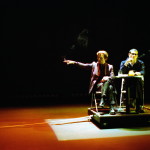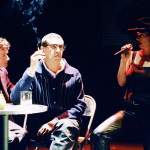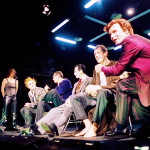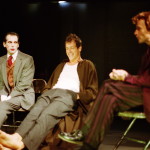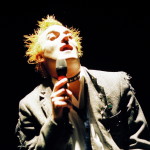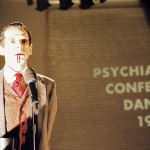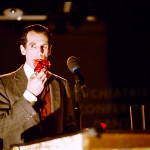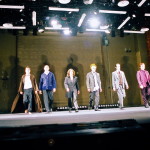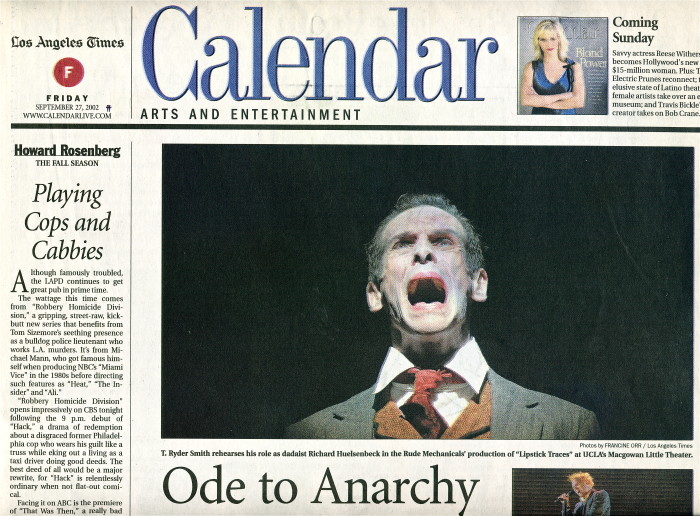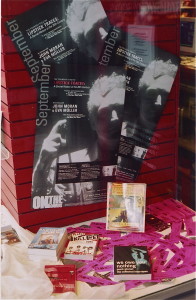Photos by T. Ryder Smith/The Hinge Collective
Above, from top, l to r: Lana Ledley, Jason Liebrecht, Randolph Curtis Rand, T. Ryder Smith, Darren Pettie, Henry Stram; Henry Stram; Darren Pettie, Randolph Curtis Rand, T. Ryder Smith; same, same; T. Ryder Smith; same; same; same; same; Henry Stram, Randolph Curtis Rand; same; same, with Lana Ledley; Lana Ledley, Jason Liebrecht, Randolph Curtis Rand, T. Ryder Smith, Darren Pettie, Henry Stram; Lana Ledley, Jason Liebrecht, Randolph Curtis Rand, T. Ryder Smith; same; Jason Liebrecht; same; T. Ryder Smith; same; Darren Pettie, Randolph Curtis Rand, Lana Ledley, Jason Liebrecht, Henry Stram.
Excerpts from the reviews
Full reviews are below
“A breakneck, fitfully transcendent adaptation of Marcus’s book now tearing up the seats at UCLA . . . The book’s splintered insights and cut-and-paste aesthetic have been ingeniously captured in this suitably self-subverting adaptation . . . Lying flat on the page, [the book] ‘Lipstick Traces’ is a big, artfully unruly, semi-underground guide to mad-prophet role models and the savage creativity spawned by civilization and it’s discontents. . . . Free-associating with impunity, and minting aphorisms apparently at will. ‘Lipstick Traces’ charted a smeary, oddball trajectory from the heretic preachings of 16th-century priest John of Leyden, to the anti-art pranksterism of the dadaist bad boys, to the neo-socialist paradoxes of the student-led Situationist International . . . Cross-cutting with furious ambition, the Rude Mechs re-imagine episodes from these transformative epochs with a witty resourcefulness . . . Suggesting a lost episode of ‘Beyond the Fringe’, the Cabaret Voltaire scene is a scary, risible dance of sublimated violence and vulnerability, given life by Darren Pettie, Randolph Curtis Rand and T. Ryder Smith, who’s superbly menacing as the dada poet Richard Huelsenbeck . . . The production is always threatening to drop through the floor, to disintegrate into it’s own slightly juvenile self-consciousness. Yet it stays aloft through it’s raw, unnerving energy, restless idea-shuffling, and a kind of brutally wistful poetry . . .“ Reed Johnson, The Los Angeles Times
“While we’re not easily shocked anymore, the play still boasts enough anarchic pop that you’re fairly amazed to be in it’s presence.” David Kronke, The LA Daily News
“While nobody could call this play a pleasure, seeing it is an enlarging, even heartening experience.” Regina Hackett, The Seattle Post-Intelligencer
“A brain-bending performance piece about art and anarchy.” Misha Berson, The Seattle Times
“Smart, energetic and nimble . . . Moves with all the energy and speed of a Buzzcocks single . . . As rude and irreverent as it’s subject matter . . . Performances are uniformly first-rate . . . Engaging, provocative . . . ” Steve Mirkin, Reuters/Entertainment Tonight Online
Publicity
LA Weekly, Sandra Ross. ANARCHY IN THE UCLA. The entrance of the character Johnny Rotten sent two matrons fleeing for the exit at the Los Angeles premiere of THE FOUNDRY THEATER’s production of LIPSTICK TRACES at UCLA. Conceived and directed by glam diva SHAWN SIDES and created by the RUDE MECHANICALS, playwright Kirk Lynn’s 75-minute turbocharged adaptation of Greil Marcus’ book about 20th-century art movements theatrically connects the dots between Situationism, Dadaism and punk rock. Among those who stayed for this exciting and technically flawless play were actors FRANCES CONROY (of Six Feet Under), KEVIN BUFFY and JOHN FLECK (who recently finished an extended run of his one-man show Nothin’ Beats Pussy, another big hit for the Evidence Room). Even the after-party at Westwood’s trendy PALOMINO restaurant took on a DIY aura: Despite printed invitations with directions, no one had notified the bistro that a large group of theater revelers would be descending post-performance, many of whom were decked out in upscale punk gear. Affable actor JASON LIEBRECHT (who plays Rotten/Lydon) was thrilled when informed that his mere physical presence sent two old broads running for the door. But for sheer punk audacity, MELANIE JOSEPH, producer of Lipstick Traces and artistic director of the Foundry Theater, wins the prize: Not only is she an unapologetic smoker, she smuggled her drink outside. Only the sidewalk cigarette butts gave evidence of lipstick traces. 10-2-02
Full reviews
Seattle Times, Misha Berson: ‘Lipstick Traces’: Rocking paean to artistic rebels. Pop quiz: what is the connection between 16th-century German heretic John of Leydon, and Johnny Rotten, lead singer of the proto-punk band the Sex Pistols? Talk among yourselves. Better yet, if the question intrigues you, get to On the Boards this weekend to catch the brain-bending performance piece about art and anarchy, “Lipstick Traces: A Secret History of the 20th Century.” Adapted from the cult book by rock and social critic Griel Marcus, “Lipstick Traces” is 75 minutes of bristling energy, ideas and noise. The Foundry Theatre produced it Off Off Broadway and put it on tour. But it was concocted by the feisty Rude Mechs troupe of Austin, Texas, a positive sign that smart, lively experimental theatrics can bubble up far from Gotham. Any reader of “Lipstick Traces” will wonder how its densely-packed, free-form zigzag through the cultural history of outrageous rebellion could possibly be dramatized. Playwright Kirk Lynn’s script and Shawn Sides’ black-box direction does it deftly, by compressing some of Marcus’ main insights and linkages into a kind of animated seminar. Moderated by an academic (Lana Lesley) wearing black leather pants and a nervous smile (“I have a Ph.D. in narration”), “Lipstick Traces” scans its pantheon of audacious misfits in short, emphatic skits demarcated by Brian Scott’s shock-therapy lighting scheme. We meet heretic John of Leydon (Darren Pettie), intoning his contrarian philosophy of drop-out desire. (“Never work. Only fools work”). And the ferocious ’70s naysayer Johnny Rotten (Jason Liebrecht), born Johnny Lydon. (Mere coincidence? Or synchronicity?) There’s the re-enacted emergence of the art/anti-art Dada movement at a Zurich cabaret in 1916. And some mordantly funny encounters with late-’60s French intellectual Guy Debord of the Situationists — an anarchic underground bunch that championed chaotic real-life “situations” over fabricated works of art. But the main event is the birth of punk rock — viewed with respect if not reverence. Band manager Malcolm McLaren (played with swishy panache by Henry Stram) wafts around as a fey hustler who claims credit for packaging anarchy for profit — that is, inventing the Sex Pistols in the mid-1970s and marketing the life out of them until they disbanded a few years later. But for all his cagey salesmanship, the show underscores that McLaren did not “invent” Johnny Lydon/Rotten, enacted with sneering charisma by Liebrecht. In an explosive sequence, the orange-haired singer, wearing a suit held together with dozens of safety pins, auditions for McLaren with a furious, manic sing-along to the Alice Cooper hit “Eighteen.” At another point, Rotten beats the British censors by snarling profanity during a TV interview. Were the Sex Pistols, with their cries of “Who Killed Bambi?” and their rage over the falseness of the world around them, really harbingers and/or heroes? Do those who rail flamboyantly against the tide, either surfing on or drowning in nihilism, keep us honest? Or are they just megalomaniacs out for attention? Using staging techniques forged by some great theatrical heretics (Artaud, Brecht, the Wooster Group), “Lipstick Traces” wisely leaves you with more questions and points of debate than answers. And it widens its inquiry with a dizzying, 4-1/2-minute historical recap by Lesley that misses some major epochal markers, but at least ties the ferocious disgust of early-20th-century rebels to the devastation of World War I. Near the end, however, Rotten declares, “You should never be completely understood.” That’s a sentiment any rabble-rouser worth his spit can share, and one “Lipstick Traces” endorses.
Seattle Post-Intelligencer, Regina Hackett: ‘Lipstick’ traces the trail of anarchy. “Lipstick Traces” is not about lipstick and certainly not about its traces. Smeared on a glass or pressed on a mirror, lipstick traces are signs of a romantic hangover, full of longing and inertia. When looking for their musical equivalent, most people think of Billie Holiday or Frank Sinatra, not Johnny Rotten. Had Greil Marcus’ book, “Lipstick Traces: A Secret History of the 20th Century,” demonstrated a more conventional understanding of its signature image, it would have been a lot easier to stage. Although romance is never out of date, anarchy needs special historical moments to spawn its zealots and the dispossessed intellectuals who admire them. Closing a four-night run tonight at On the Boards, a six-person theatrical company known as the Rude Mechs from Austin, Texas, accomplishes the nearly impossible task of turning Marcus’ dense, heady text into 75 minutes of fast-paced and absorbing drama, produced by The Foundry Theatre in New York. Lipstick in the Marcus sense has more to do with a wound than adornment, more about violence than sex appeal. The evening opens with the shock of headlights turned full force on the audience. Crouching in the shadows is John of Leyden (Darren Pettie), a heretical 16th-century monk who disapproves of work and endorses desire. Naturally, his times being what they were, he was plucked limb from limb and burned with pokers. A lounge lizard in a shiny purple suit, Malcolm McLaren (Henry Stram), promoter of the Sex Pistols, strolls in to explain the similarities between Johnny Rotten and John Leyden. He praises his own efforts as “burying a critique of the purchase inside the product,” which leads naturally to German dadaists between the world wars and the French Situationists in the 1970s, with theorist Guy Debord brilliantly played by Randolph Curtis Rand. Everybody smokes, Johnny Rotten (Jason Liebrecht) screams and the real Rotten is heard singing what Marcus calls his masterpiece, “Anarchy in the UK.” Who knew there was a theatrical experience lurking in Marcus’ book? Certainly not Marcus. The credit goes to director Shawn Sides, play adapter Kirk Lynn and the actors, all fabulous. The one false note is a character called Dr. Narrator (Lana Lesley), who wastes that actor’s considerable talents with unnecessary, shrill explication. “I believe I know a tidbit or two,” says Rotten, smirking at the audience. Yes he does, and while nobody could call this play a pleasure, seeing it is an enlarging, even heartening experience. 10-12-02
Los Angeles Times, Reed Johnson: Ode to Anarchy. The oddball trajectory of ‘Lipstick traces’ runs from a 16th century heretic to 20th century punk rock. History repeats itself: first as tragedy, then as farce, then as a spitting, preening British punk rock quartet. In radically abridged form, that’s the exhilarating thesis that drove “Lipstick Traces,” the 1989 cult-classic “secret history of the 20th century” by Greil Marcus, the Claude Levi-Strauss of contemporary music critics.Did we say “history”? But what, exactly, is that? “Perhaps it’s getting the last word,” proposes Malcolm McLaren, the Rasputin-like London boutique owner and calculating impresario behind the Sex Pistols, the proto-punk outfit whose ornery stage theatrics and marginal technical competence failed to disguise its passion, raging intelligence and notorious refusal to play by the rules of bloated, self-important, mid-’70s corporate rock. In the breakneck, fitfully transcendent adaptation of Marcus’ book that’s now tearing up the seats at UCLA’s Macgowan Little Theater, it only deepens the audience’s amusement and moral turbulence that McLaren is being played by the dandyish Henry Stram, walking a mincing line between characterization and impersonation, as a cross between P.T. Barnum and Oscar Wilde. And why not? If even rebellion can be turned into a commodity under modern capitalism, why shouldn’t the Malcolm McLarens of this world make a fast buck off all the youthful fear and loathing hanging out on Kings Road? Or Melrose Avenue, for that matter? Yet back, for a moment, to Marcus’ book, whose splintered insights and cut-and-paste aesthetic have been ingeniously captured in this suitably self-subverting adaptation by the Rude Mechanicals ensemble out of Austin, Texas (kudos to playwright-adapter Kirk Lynn). Lying flat on the printed page, “Lipstick Traces” is a big, artfully unruly, semi-underground guide to mad-prophet role models and the savage creativity spawned by civilization and its discontents. Assembling a prismatic narrative out of misplaced historical footnotes, bizarre convergences and sparkling, philosophical prose, Marcus drew startling connections between seemingly disjointed cultural occurrences and their compelling frontmen. Free-associating with impunity, and minting aphorisms apparently at will, “Lipstick Traces” charted a smeary, oddball trajectory from the heretic preachings of 16th century priest John of Leyden, to the anti-art pranksterism of the dadaist bad boys, to the neo-socialist paradoxes of the student-led Situationist International, which paralyzed France with a series of work stoppages in 1968. Cross-cutting with furious ambition, the Rude Mechs re-imagine episodes from these transformative epochs with a witty resourcefulness, enhanced by the simple, effective design team of Darron West (sound), Brian Scott (lights) and Rachel Carr (costumes). The show gets off to a smash-mouth start as Marcus’ scholarly stand-in, Dr. Narrator (Lana Lesley), grabs a mike and plays analyst-hostess to the show’s time-tripping dramatis personae. A sonic blast and a battery of stage lights usher in John of Leyden (Darren Pettie), bellowing his gospel of permissive pleasures like some millenarian rock god. In a flash, director Shawn Sides’ inventive staging whisks us to the Cabaret Voltaire, where the dadaists vented their absurdist anger at a decadent Europe worn out by World War I. Suggesting a lost episode of “Beyond the Fringe,” the scene is a scary, risible dance of sublimated violence and vulnerability, given life by actors Pettie, Randolph Curtis Rand and T. Ryder Smith, who’s superbly menacing as dadaist poet Richard Huelsenbeck. Finally–or, rather, elliptically, in the style of Marcus’ riffing revisionism–the show segues to the anarchic, off-key ravings of John Lydon, a.k.a. Johnny Rotten, the Sex Pistols’ coruscating lead singer, well-played by a sneeringly charismatic Jason Liebrecht. Re-creating Rotten’s (in)famous Sex Pistols “audition,” when he growled and slurred his way through Alice Cooper’s “18,” “Lipstick Traces” suggests that what the dadaists were to spiritually bankrupt Europe in 1920, the Sex Pistols were to a British nation that was paralyzed in the late ’70s by strikes, rising oil prices and a pervasive cynicism about the shriveling of the promised good life. But never mind the bollocks. What gives this stage version its pop and sting isn’t just Marcus’ provocative theorems, which the kinetic six-member cast obligingly diagrams on a blackboard at one point. Blurring by in 75 intermission-less minutes, “Lipstick Traces” is always threatening to drop through the floor, to disintegrate into its own slightly juvenile self-consciousness. Yet it stays aloft through its raw, unnerving energy, restless idea-shuffling and a kind of brutally wistful poetry such as you might encounter in an early Raymond Pettibon drawing. Sprinting, at times, toward the brink of incoherence, the show escapes its aggressive pedantry by leapfrogging backward over itself, leaving the audience struggling to keep up. Needless to say, “Lipstick Traces” won’t be everyone’s pint of strychnine-laced Guinness. But as Rotten might paraphrase Picasso, art is a lie that makes us drink, fight, swear, puke, stick a safety pin in our cheek, drink some more and, yes, eventually see the truth. The Sex Pistols showed young Brits, and other youth the world over, how to party on truth’s wreckage. No matter, for the moment, if we were really only dancing on our culture’s exquisite corpse. 9/27/02
LA Daily News, David Kronke: WANNABE ANARCHY: THE RUDE MECHS BRING GREIL MARCUS’ TREATISE ON THE PUNK MOVEMENT TO THE STAGE. “This is actually happening.” That was Pete Townshend marveling at the Sex Pistols’ brand of on-stage mayhem, and a recurring theme in “Lipstick Traces: A Secret History of the Twentieth Century,” a theatrical adaptation of Greil Marcus’ luridly brilliant 1989 book of pop history. And while we’re not easily shocked anymore, the play still boasts enough anarchic pop that you’re fairly amazed to be in its presence. “Lipstick Traces,” produced by the Rude Mechs troupe of Austin, Texas, wouldn’t mind performing for theater the same sort of aesthetic tracheotomy the Sex Pistols and Marcus’ book attempted for pop music and rock criticism, respectively: Explode conventions, erase expectations, strip away banality. If you get a few laughs along the way, so much the better. Marcus reads like a really smart, peyote-and-tequila-soaked guy trying to write down everything he knew in the space of one night. His goal was to contextualize the brief, Icarus-like punk movement of the ’70s in a wider history of absurdist social rebellion in which the mainstream was an avowed enemy. As he put it, “Something done with actual violence to resistant forms of life.” “Punk was ‘like dada,’ everybody said, though nobody said why,” Marcus wrote, words put into the mouth of one of the characters, “let alone what that was supposed to mean.” The book and the play explains it all for you. Upon the empty, industrial-looking stage, the show begins unexpectedly with a burst of blinding light and a cacophony of noise, ending with Johnny Rotten’s famous sound bite: “Ever get the feeling you’ve been cheated?” First, we meet John of Leydon (Darren Pettie), a 15th-century Anabaptist who took over an entire town for about a year and made life pretty interesting – polygamy was rule of law, great feasts were followed by executions – before he was publicly tortured and killed. Marcus divines something from the brands of anarchy practiced by John of Leydon and John Lydon, rechristened as Johnny Rotten. In short order, the play introduces us to Malcolm McLaren (Henry Stram), who created the Sex Pistols; Rotten (Jason Liebrecht); Richard Huelsenbeck (T. Ryder Smith), a psychiatrist who helped initiate the Dada movement; and Guy Debord (Randolph Curtis Rand), who led the similar French collective Situationist International in the late ’50s and ’60s. The play’s glue and biggest postmodern giggle comes in the form of Dr. Narrator (a very funny Lana Lesley), alternately confident and a puddle of insecurities – she has a Ph.D. in narration, she boasts, adding uncertainly, “I’m not fiction, but I’m not real.” The play, in general, lurches back and forth from breathless sequences (Dr. Narrator, backed by Dylan-esque “Don’t Look Back”-style cue cards, presents “The History of the 20th Century in Four and a Half Minutes”) to long, discomfiting passages exploring “the politics of boredom.” It’s kind of like MTV for intellectuals. “Lipstick Traces” clocks in at a brisk 75 minutes, which suggests that although Rude Mechs has an abiding understanding of the theater of discomfort, in which the subjects of this play reveled, the group likewise comprehends the patience levels of the commercial marketplace. LIPSTICK TRACES – Three stars. In a nutshell: As Dr. Narrator, Lana Lesley holds the gleefully anarchic show together and provides its best laughs.
a-diction.com – offreview: I saw this show in L.A. at a small theatre on the UCLA campus. Final night of the run. Based on what I read, the performance was done by local L.A. actors because the Rude Mechanics people voted to stay home in Austin (I think). So, it was all LA people except for the director, I think. Ok, so, on to what matters- the performance. First off, I’ve only read bits of the book. I think Greil Marcus’s son went to my highschool, so that’s how I even heard about him in the first place. And I like the Sex Pistols, but most importantly, I really REALLY like the Dada artists. I fixated on them all through highschool and college. I have he collections of Dada writings. I have the SubRosa record of sound poems and interviews. Dada is my cup of tea. Oh, wait, the performance, YEAH Right! The stage is bare except for some lights that beam right at the audience like headlights and during the play a few simple props are carried on stage- a few chairs, a rolling dumpster, a movie screen. That’s about it. The sound ISN’T that loud, although there are a few scenes where the sound does drown out the dialog a bit and that REALLY annoyed me because it was disrespectful to the writing. Yeah, the music is important, but it shouldn’t have taken precedence over the writing ever. The audience, by the way, was a mix of college students, a few punkers, and some gray-haired theatre buffs. I am none of the above. The play starts with John of Leyden giving his speech about the odiousness of work. It’s strong, passionate and a good start. Then out comes the narrator, a young-ish woman playing a grad student-type of persona who’s the researcher/compiler/MC/introducer for the rest of the play. She plays it breathless, harried, in a rush, enthusiastic, confused… sort of slapstick. She’s the only female in the cast which makes me wonder why? Aren’t there any significant contributions to punk made by women??? At one point she also plays Siouxsie Sioux during the Bill Grundy show that the Sex Pistols appeared on (by the way, if you’ve seen the Sid and Nancy DVD then you’ve seen the actual clip which is amazing). Anyways, I found her character dippy and annoying. If the punk characters had been cold and hostile, then maybe her friendliness would have been used as a form of accessibility, but I don’t think it was necessary. Anyway, the actor who played Huelsenbeck was AMAZING. A-FUCKIN-MAZING! All of the characters and speeches are condensed amalgams of reality- and at certain points they stray from the truth to make a point. After re-creating a Cabaret Voltaire performance (which I made a pilgrimage to in 1994, by the way, and the pub was closed for repairs and covered with scaffolding but there is a gold plaque outside) they show Johny Rotten trying out for the pistols and his performance echoes the Dadaists. The Malcolm McClaren character was great. The Situationist scenes were also excellent. I thought the Johny Rotten character was a bit weak and played very sulky instead of spiteful. Final words: Go see it if you get the chance. The pace is fast, the performances were strong and the material is fascinating. It’s just really weird to pay $35 to watch a story about punk being performed on stage. 10-29-02
[previous] [next]


